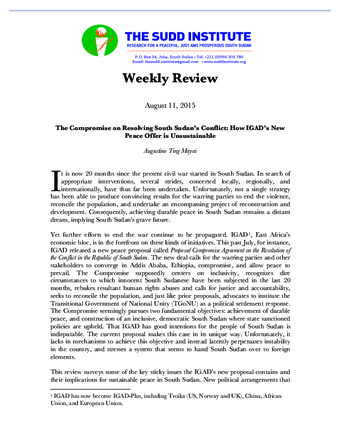The Compromise on Resolving South Sudan’s Conflict: How IGAD’s New Peace Offer is Unsustainable
Publication Summary
It is now 20 months since the present civil war started in South Sudan. In search of appropriate interventions, several strides, concerted locally, regionally, and internationally, have thus far been undertaken. Unfortunately, not a single strategy has been able to produce convincing results for the warring parties to end the violence, reconcile the population, and undertake an encompassing project of reconstruction and development. Consequently, achieving durable peace in South Sudan remains a distant dream, implying South Sudan’s grave future.
This review surveys some of the key sticky issues the IGAD’s new proposal contains and their implications for sustainable peace in South Sudan. New political arrangements that seek to minimize monopoly by certain actors, nationalize security apparatus, demilitarize the nation’s capital, earmark resources for reconstruction and reconciliation, and develop and introduce mechanisms for managing the nation’s resources, for example, are a necessary direction for the country that is incredibly embroiled in fragility. However, expanding the government merely to cater for politicians violates the social contract upon which durable peace relies, inciting the general public against the system. Indeed, the proposed Compromise, if endorsed by all parties, could engender temporal calm, reunite politicians, and reinstitute opportunities for local and international trade, but just like the accommodation model the Government of South Sudan has thus far adopted, in the long-term, the current truce has potential to deliver future waves of violence. Under the new IGAD peace model, investment in reconstruction, reconciliation, and service delivery, for instance, is restrained. South Sudan’s resources, which are increasingly getting scanty, will be spent on politicians and the army, not development. The rest of the review details some of the problems in the proposal. It concludes with the proposition that the Arusha model may be more fitting for sustainable peace in South Sudan than the IGAD team in Addis Ababa currently offers.
Augustino Ting Mayai's Biography
Augustino Ting Mayai is the former Managing Director of the Sudd Institute. He is a founding Research Director of the same institution, serving in this capacity for a decade. He holds a Ph.D. in Sociology, with concentrations on demography and development from the University of Wisconsin-Madison. He currently studies how state effectiveness affects child health outcomes in South Sudan and Ethiopia. Dr. Mayai has written extensively on South Sudan’s current affairs. August is the current Chair (Statistician General) of the National Bureau of Statistics, Government of South Sudan.

